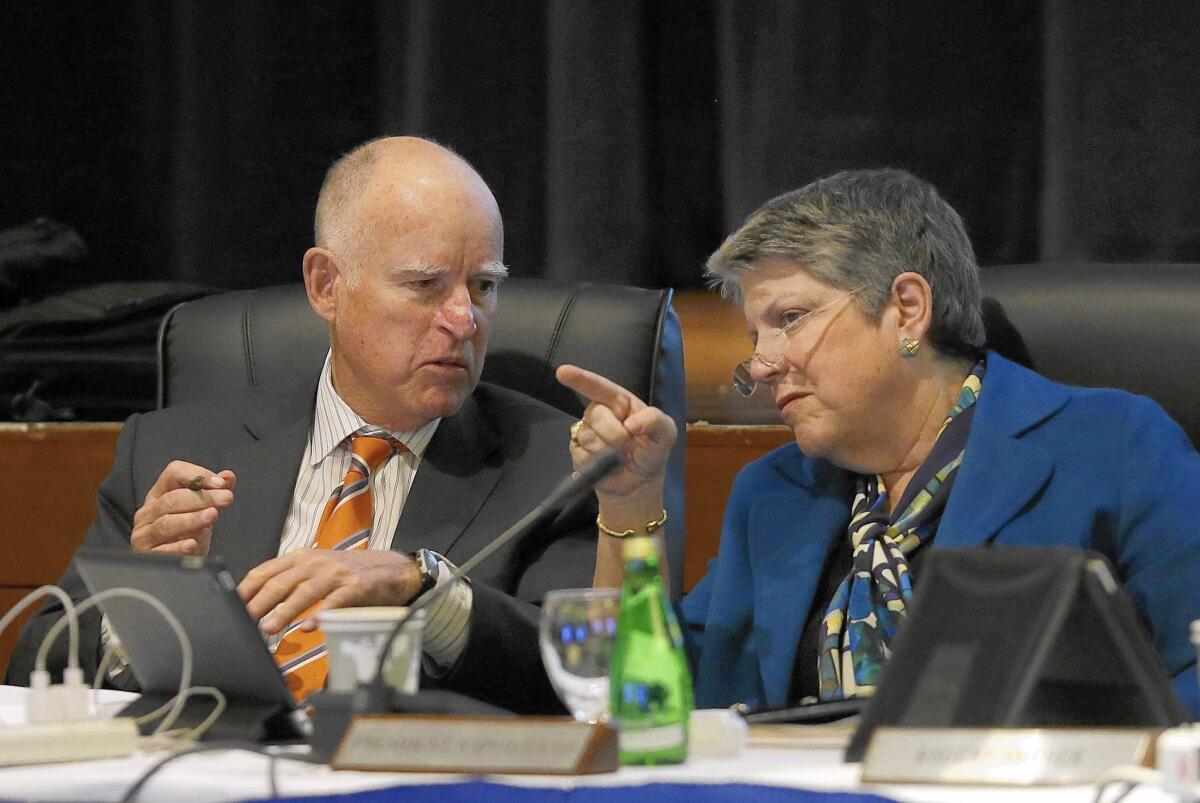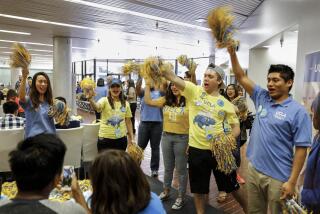UC extends discounted tuition to military veterans

Military veterans and their dependents who are UC students will be able to pay lower in-state tuition even if they otherwise are not eligible, the UC regents decided Thursday.
The move came primarily in response to a federal law enacted last year that requires all public universities to allow veterans to pay the lower costs or lose the substantial revenues from the GI Bill financial aid programs. The 10-campus UC system received at least $30 million in those federal grants for the education of about 1,400 veterans and family members in the 2013-14 school year, officials said.
Beyond the pressure from the federal government, UC regents said they wanted to accommodate military families whose duties often move them so frequently that they do not have the chance to establish residency long enough to qualify for in-state discounted tuition. And they said they wanted to honor the service of military veterans.
UC officials said they did not know exactly how many students will directly benefit from the more lenient policy, but that fewer than 300 of those receiving GI Bill aid were thought to be nonresidents and paying tuition beyond the in-state level the federal scholarship covers. The policy change awards the discount to any veterans who were discharged within three years of becoming students, which the regents said they hope encourages more of them to attend UC.
In-state undergraduates pay about $12,200 for tuition, not including room, board and other costs, while students from other states and nations pay about $23,000 on top of that. Financially independent adult students usually need to have lived in California more than a year and show intent to become permanent residents to qualify for the lower tuition; younger students face higher thresholds of proving they have been living on their own income for several years.
In another matter, UC President Janet Napolitano publicly apologized Thursday for describing a disruptive student protest as “crap” the day before.
MORE: UC student group rejects Napolitano’s apology for ‘crap’ remark
“I’m sorry for using a word I don’t usually use,” Napolitano told the regents and audience members at the start of Thursday’s meeting at UC San Francisco. Her choice of the word, she said, was “unfortunate.” But she also asked for “empathy and understanding” in what led to her videotaped remark she had meant as private.
As student protesters interrupted Wednesday morning’s meeting with chanting and partial disrobing, Napolitano turned to UC regents Chairman Bruce Varner and said: “Let’s go. We don’t have to listen to this crap.”
With all the yelling in the room, few others probably heard her, but her comments were caught on a UC video stream of the meeting that is posted on the regents website.
During her apology Thursday, Napolitano noted that the protest had interrupted the public comment period and discussions over the budget situation UC is facing. She said that “protecting the accessibility, affordability and quality” of UC education is the most important work ahead.
Also on Thursday, a coalition of Jewish and education groups urged the regents to take additional steps in response to several recent campus incidents they say were anti-Semitic. UC should adopt the U.S. Department of State policy that defines anti-Semitism as including the denial of Israel’s right to exist and likening Israeli policies to that of the Nazis, the groups said.
Using such a definition, UC chancellors and officials should “develop clear protocols for addressing campus anti-Semitism with the same promptness and vigor as they do other forms of racial, ethnic and gender bigotry and discrimination,” said Tammi Rossman-Benjamin, a UC Santa Cruz lecturer who is co-founder of the AMCHA Initiative, a group that has accused UC of being hostile toward Jewish students. She spoke to the regents during the public comment period.
The AMCHA group and others cited recent swastika graffiti on a Jewish fraternity at UC Davis and the controversy at UCLA when some student government members questioned whether a student should be disqualified from appointment to a judicial review panel because they said that being Jewish might make her unable to render impartial decisions. The student eventually was approved for the post and those who had raised the questions apologized.
UC officials have condemned those incidents and anti-Semitism in general. However, they say that free speech rules protect student governments that have voted to urge the regents to sell off stocks in companies that do business with the Israeli military. Rossman-Benjamin and others contend such divestment campaigns are fostering anti-Jewish feelings.
Dianne Klein, a UC spokeswoman, said university leaders take any allegations of anti-Semitism “very seriously” and will look into the proposal.
larry.gordon@latimes.com
Twitter: @larrygordonlat
More to Read
Start your day right
Sign up for Essential California for news, features and recommendations from the L.A. Times and beyond in your inbox six days a week.
You may occasionally receive promotional content from the Los Angeles Times.







